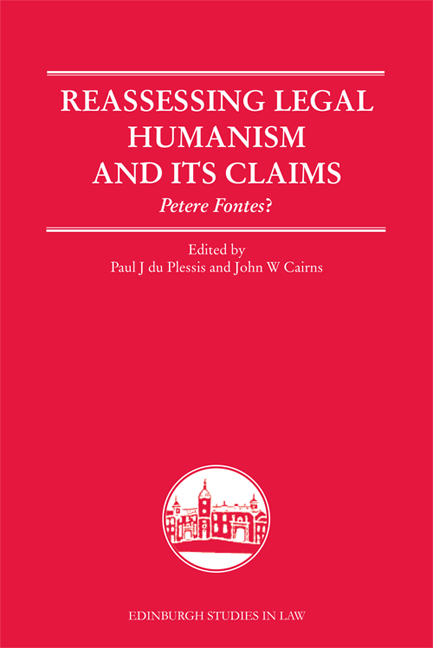Book contents
- Frontmatter
- Contents
- Preface
- A Note on Names and Book Titles
- List of Contributors
- List of Abbreviations
- Introduction
- Part I DEFINING LEGAL HUMANISM
- Part II A BREAK WITH THE PAST/CONTEMPORARY CRITIQUES
- Part III LEGAL HUMANISM: A PAN-EUROPEAN METHODOLOGY?
- Part IV LEGAL HUMANISM AND THE BOOK TRADE
- 12 The Thesauruses of Otto and Meerman as Publishing Enterprises: Legal Humanism in its Last Phase, 1725–1780
- 13 Humanist Books and Lawyers’ Libraries in Early Eighteenth- Century Scotland: Charles Areskine of Alva's Library
- Postscript
- Index
13 - Humanist Books and Lawyers’ Libraries in Early Eighteenth- Century Scotland: Charles Areskine of Alva's Library
from Part IV - LEGAL HUMANISM AND THE BOOK TRADE
Published online by Cambridge University Press: 05 September 2016
- Frontmatter
- Contents
- Preface
- A Note on Names and Book Titles
- List of Contributors
- List of Abbreviations
- Introduction
- Part I DEFINING LEGAL HUMANISM
- Part II A BREAK WITH THE PAST/CONTEMPORARY CRITIQUES
- Part III LEGAL HUMANISM: A PAN-EUROPEAN METHODOLOGY?
- Part IV LEGAL HUMANISM AND THE BOOK TRADE
- 12 The Thesauruses of Otto and Meerman as Publishing Enterprises: Legal Humanism in its Last Phase, 1725–1780
- 13 Humanist Books and Lawyers’ Libraries in Early Eighteenth- Century Scotland: Charles Areskine of Alva's Library
- Postscript
- Index
Summary
A. INTRODUCTION: CHARLES ARESKINE OF ALVA
B. SCOTTISH EDUCATION AND SCHOLARLY TRAVEL
(1)Humanism and early modern Scottish education
(2)Scholarly travel
C. LEARNING IN THE LOW COUNTRIES
(1)Arts and law
(2)Legal textbooks at Leyden
(3)An academic social network
(4)Book collecting abroad
D. BUYING LEARNED BOOKS IN BRITAIN
(1)London
(2)Edinburgh
E. ARESKINE's BOOKS: HUMANISM AND LEGAL HISTORY
(1)Traditional legal history
(2)Challenges to the traditional legal history narrative
(3)Areskine and the legal history narrative
F. EARLY MODERN LAW BOOKS
G. HUMANIST LAW BOOKS
(1)Legal humanists
(2)“Bibliotheca juris civilis Romani”
(3)Areskine as a legal humanist
H. HUMANISM IN EIGHTEENTH-CENTURY SCOTLAND
I. LAW TEXTS AS PART OF A LIVING LEGAL SYSTEM: CONVERSATIONS AND TOOLS
(1)Conversations with the dead
(2)Tools of the trade
J. CONCLUSIONS: BOOKWORMS AND MOTHS
INTRODUCTION: CHARLES ARESKINE OF ALVA
Charles Areskine of Alva, Lord Tinwald (1680–1763) was a leading figure of the Scottish legal establishment in the early eighteenth century. He was a teacher and professor, the first Regius Professor of the Law of Nature and Nations at Edinburgh, before he changed tack and became an advocate in 1711. His legal career lasted more than fifty years. He was appointed Solicitor General in 1725, then Lord Advocate in 1737. He was elected to the Bench as Lord Tinwald in 1744 and he became Lord Justice Clerk in 1748. Areskine was later praised as
… an eminent lawyer and judge, but likewise a polite scholar, and an elegant speaker and writer … This gentleman was possessed of excellent talents, which were improved by culture, and set off to great advantage by a graceful persuasive eloquence in a strain peculiarly his own.
Areskine's professional success and the income he derived from his estates enabled him to collect a large library of books. From 1731 until his death, Areskine kept a catalogue of his growing collection. This library catalogue, and many of his books, survives in the National Library of Scotland, giving the opportunity for an exploration of the books collected and used by an eminent Scottish lawyer of the first half of the eighteenth century.
- Type
- Chapter
- Information
- Reassessing Legal Humanism and its ClaimsPetere Fontes?, pp. 348 - 376Publisher: Edinburgh University PressPrint publication year: 2015



